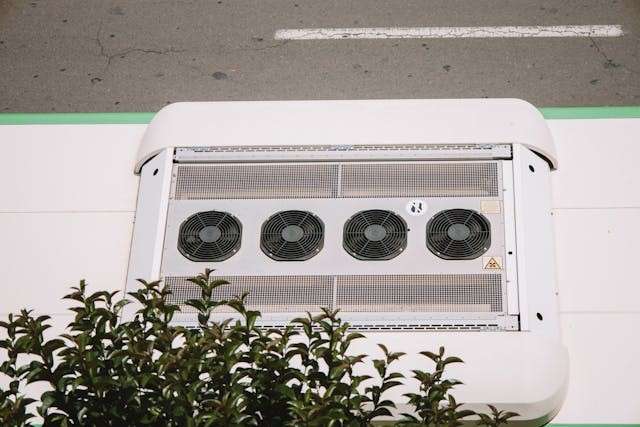Inverter technology has revolutionized the world of air conditioning systems, offering a host of advantages over traditional fixed-speed units. These advancements have transformed the way we cool our spaces, providing greater efficiency, comfort, and cost savings. In this article, we’ll delve into the advantages of inverter technology in AC systems.
Understanding Inverter Technology
Before exploring its benefits, let’s grasp the fundamentals of inverter technology. Unlike conventional air conditioners that operate at a fixed speed, inverter ACs utilize variable-speed compressors. This allows them to adjust their cooling capacity according to the specific requirements of the space, resulting in optimal performance and energy efficiency.
Energy Efficiency
One of the primary advantages of inverter technology is its superior energy efficiency. By modulating the compressor speed, these systems can precisely match the cooling load, minimizing energy wastage associated with frequent cycling on and off. As a result, inverter ACs consume significantly less power compared to their non-inverter counterparts, leading to reduced electricity bills and environmental impact.
Enhanced Comfort
Inverter ACs offer a more consistent and precise cooling experience, thanks to their ability to maintain a stable temperature without abrupt fluctuations. Traditional units often struggle to maintain consistent temperatures, leading to discomfort and uneven cooling. In contrast, inverter technology ensures a more comfortable indoor environment by adjusting cooling output as needed, even during varying weather conditions.
Quieter Operation
Another notable advantage of inverter ACs is their quieter operation. Fixed-speed compressors tend to produce more noise due to their abrupt cycling on and off. Inverter technology, however, allows the compressor to operate at lower speeds most of the time, resulting in reduced noise levels. This quieter operation is particularly beneficial for environments where noise pollution is a concern, such as bedrooms or office spaces.
Extended Lifespan
Inverter ACs typically have a longer lifespan compared to traditional units. The gradual and smoother operation of the compressor reduces wear and tear on the system, leading to less frequent maintenance and repairs. Additionally, the ability to operate at lower speeds for extended periods helps prevent sudden breakdowns, prolonging the overall lifespan of the air conditioning unit.
Quick Cooling
Inverter technology enables air conditioners to achieve the desired temperature more quickly compared to fixed-speed units. The ability to ramp up cooling capacity rapidly ensures that occupants experience comfort almost immediately after turning on the AC, eliminating the need to wait for the room to cool down gradually.
Extended Comfort
Inverter technology goes beyond merely maintaining a stable temperature; it also provides extended comfort through its advanced features. Many inverter ACs come equipped with features such as humidity control and air purification, enhancing the overall indoor air quality. This ensures not only optimal cooling but also a healthier and more pleasant environment for occupants. By regulating both temperature and humidity levels, inverter ACs create a more comfortable living or working space, especially in regions with varying climates or high humidity levels.
Adaptability to Variable Conditions
Inverter ACs demonstrate remarkable adaptability to variable conditions, making them ideal for environments where temperature and cooling requirements fluctuate throughout the day. Whether it’s a sudden heatwave or a cool evening, these systems can adjust their cooling capacity on-the-fly, ensuring consistent comfort without the need for manual intervention. This flexibility is particularly beneficial in commercial settings where occupancy levels may vary, allowing the AC system to adapt dynamically to changing demand, thereby optimizing energy usage and cost savings.
Smart Connectivity and Control
With the advent of smart technology, inverter ACs have evolved to offer enhanced connectivity and control features. Many modern units come equipped with Wi-Fi connectivity, allowing users to remotely monitor and control their AC systems via smartphone apps. This level of control enables users to adjust temperature settings, schedule operations, and receive energy usage insights from anywhere, providing convenience and flexibility. Moreover, some inverter ACs integrate seamlessly with home automation systems, offering even greater convenience and energy savings through intelligent scheduling and integration with other smart devices.
Environmental Sustainability
Inverter technology aligns with global efforts towards environmental sustainability by reducing carbon emissions and energy consumption. The superior energy efficiency of inverter ACs translates into lower electricity consumption, resulting in reduced reliance on fossil fuels for power generation. This not only helps mitigate climate change but also contributes to lower operational costs and greater long-term savings for users. As governments and organizations worldwide prioritize environmental conservation, the adoption of inverter technology plays a crucial role in achieving sustainability goals while providing superior cooling solutions for a wide range of applications.
Conclusion
In conclusion, the adoption of inverter technology in air conditioning systems has brought about significant advancements in terms of energy efficiency, comfort, and performance. By utilizing variable-speed compressors, inverter ACs offer superior efficiency, quieter operation, extended lifespan, and faster cooling compared to traditional units. As energy conservation and sustainability become increasingly important considerations, the benefits of inverter technology make it a compelling choice for residential, commercial, and industrial cooling applications.

As the editor of the blog, She curate insightful content that sparks curiosity and fosters learning. With a passion for storytelling and a keen eye for detail, she strive to bring diverse perspectives and engaging narratives to readers, ensuring every piece informs, inspires, and enriches.










